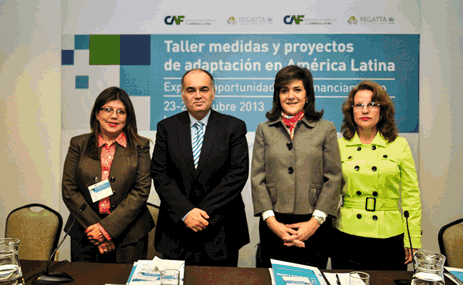
Financing options for adaptation to climate change are analyzed
Convened by CAF and UNEP, experts exchanged experiences regarding the strengthening of South American entities to recognize their "climate financing" needs.
(Lima, October 23, 2013). Experts from eight countries in the region analyzed and exchanged experiences regarding how to contribute to strengthen governmental and non-governmental institutions in Argentina, Bolivia, Colombia, Chile, Ecuador, Paraguay, Peru and Uruguay, to recognize their financial needs and identify the existing options associated to the national efforts for Adaptation to Climate Change.
This meeting took place in the framework of the Workshop on Adaptation Measures and Projects "Exploring Financing Opportunities", organized by CAF, Development Bank of Latin America, and the United Nations Environment Programme (UNEP).
The activity was inaugurated by Gabriel Quijandría, Vice-Minister for Strategic Development of Natural Resources from the Ministry of the Environment, Eleonora Silva, CAF's Director Representative in Peru, Ligia Castro, Director of The Environment at CAF, and Mara Murillo, Deputy Regional Director at UNEP.
This activity, which included the participation of staff, technical personnel, and representatives from multilateral organizations, constitutes a joint effort between CAF and UNEP to bring together the adaptation efforts advanced by key actors in the countries, to the needs, as well as the financing possibilities. For this reason, a sub-regional approach has started in South America, with the idea of copying the experience in the rest of the region shortly.
Participants exchanged their experiences and methodological approaches, and reviewed the vulnerability and adaptation to climate change analyses. In addition, they reviewed the financial flows related to mitigation and adaptation at a local, national, or translational level, which may come from public, private, or alternative sources of financing.
Adaptation Program
In the framework of the workshop, CAF's Adaptation to Climate Change Program was launched. Its objective is to promote and support planned adaptation processes at the level of policies, plans, programs, and projects, to guide the construction of sustainable development in all the member countries in Latin America and the Caribbean.
For Latin America and the Caribbean, the efforts to adapt to climate change constitute one of the main challenges that governments must face in the short and medium term. In this regard, it is expected that the implementation of the policy framework chosen by the government of the region will be complemented by the support of international organizations, development banks, and donors.
The region has significantly advanced in the so-called "climate financing", referred to financial flows related to the mitigation and adaptation at a local, national, or transnational level, which may come from public, private, or alternative sources of financing.
Financing for adaptation to climate change at an international, regional, or national level is increasing, but still insufficient to cover the estimated needs. Currently, financing for mitigation actions prevails over activities aimed at adaptation.
In the framework of the current international negotiations, in general "climate financing" covers all the mechanisms and institutions implemented to promote and supervise the achievement of the collective commitment adopted by developed countries to provide new and additional financial resources to developing countries.
CAF's more recent content

CAF, ECLAC, IDB and PAHO Promote Sustainable Development in the G20
The Regional Organizations of the Americas congratulate Brazil on its successful G20 Presidency, highlighting its leadership on key issues such as poverty, governance, and climate change. They also reaffirm their commitment to actions that promote equity and development in the region.
Urgent Call for Action to Safeguard Caribbean SIDS at CAF Symposium
As the global community grapples with the escalating climate crisis, Caribbean Small Island Developing States (SIDS) are running out of time to secure critical investments and support needed to strengthen their economies and protect vulnerable communities from the intensifying impacts of climate change. With the window to take decisive action rapidly shrinking, CAF - Development Bank of Latin America and the Caribbean, in partnership with the Commonwealth Secretariat and the Antigua and Barbuda High Commission, brought together key stakeholders for a symposium in London to address the critical vulnerabilities Caribbean SIDS face.